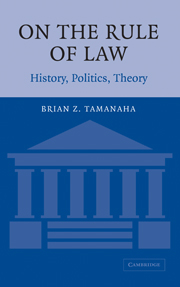Book contents
- Frontmatter
- Contents
- Acknowledgments
- Introduction
- 1 Classical origins
- 2 Medieval roots
- 3 Liberalism
- 4 Locke, Montesquieu, the Federalist Papers
- 5 Conservatives Warn
- 6 Radical left encourages decline
- 7 Formal theories
- 8 Substantive theories
- 9 Three themes
- 10 International level
- 11 A universal human good?
- Notes
- Bibliography
- Index
6 - Radical left encourages decline
Published online by Cambridge University Press: 05 June 2012
- Frontmatter
- Contents
- Acknowledgments
- Introduction
- 1 Classical origins
- 2 Medieval roots
- 3 Liberalism
- 4 Locke, Montesquieu, the Federalist Papers
- 5 Conservatives Warn
- 6 Radical left encourages decline
- 7 Formal theories
- 8 Substantive theories
- 9 Three themes
- 10 International level
- 11 A universal human good?
- Notes
- Bibliography
- Index
Summary
While the political right laments the degeneration of the rule of law in the West, radical left theorists encourage this decline. Their opposition builds upon the communitarian reaction to liberalism and upon on the negative implications of the rule of law in liberal systems, especially those related to distributive justice and formal equality. It is liberalism and capitalism that the radical left most resents, and the rule of law is attacked for the service it provides in bolstering this political and economic system. This chapter will concentrate on arguments raised amongst legal theorists in the USA, where the theoretical challenge to the rule of law has been most vociferous. Such severe criticism could only be produced in a country in which lengthy acquaintance with the rule of law confers intimate familiarity of its limitations, and also leads to a sense of security that encourages forgetfulness about its benefits.
The 1960s and 1970s witnessed a massive social upheaval in the USA, related to the fight for civil rights, protests against the Vietnam War, refusal to comply with the draft, and resistance against school busing, mixed in with broader concerns about the dire economic future (stagflation and the oil crisis), the corruption of politics (Watergate), and the sexual revolution and mind-altering drugs. President John F. Kennedy and Robert Kennedy, his brother and political heir apparent, had been assassinated. Civil rights leader Martin Luther King was murdered.
- Type
- Chapter
- Information
- On the Rule of LawHistory, Politics, Theory, pp. 73 - 90Publisher: Cambridge University PressPrint publication year: 2004



